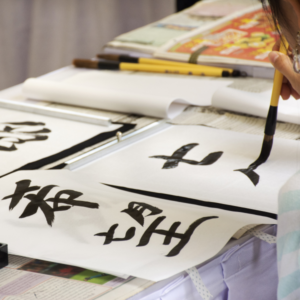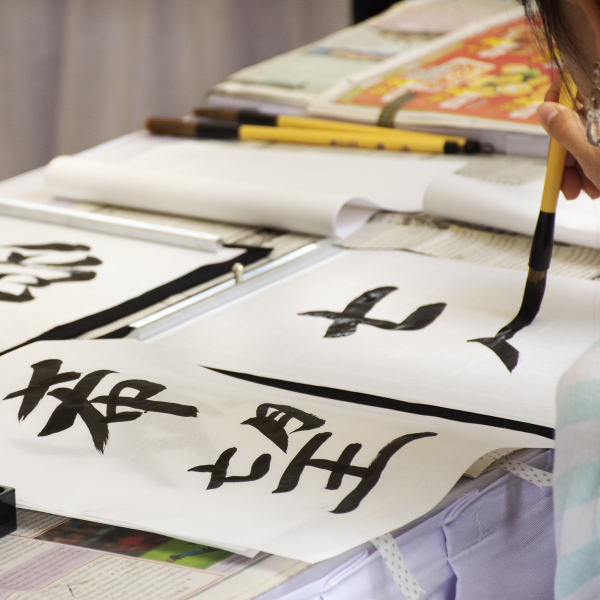Recently, I’ve been talking a lot about all the different things going on at Ippo Ippo. But what’s it actually like to learn with me?
If you'd rather hear directly from my students, click here. However, if you're curious to find out more about my more general approach to teaching Japanese, read on to find out about these five key points:
- Online lessons: camera off or on?
- Learning Japanese: online or in person?
- Learning to write Japanese: should you do it by hand?
- Textbooks: are they worth it?
- Taking breaks: how often?
Click on the links above to jump to particular sections, or simply scroll on to find out more!
1. Online Lessons: Camera Off or On?
Students sometimes ask: do I have to have my camera on during lessons?
My answer? No, it’s never compulsory! Why? Because I understand that not everyone is comfortable – or able – to keep their camera on during lessons, be that due to stress, anxiety, limited social energy/spoons, or simply because you don’t have a private space for lessons or good enough wifi to handle video calls.

If you ever come to an event or course with me, you’ll hear me explain that while I encourage people to keep their cameras on where possible, it’s always up to you.
2. Learning Japanese: Online or In Person?
When I first started teaching, I taught both in person and online. This obviously changed during the UK lockdowns.
Although I think online learning is hugely helpful both for myself and many of my students in terms of accessibility (including fitting classes into your schedule, not having to pay transport costs, being able to take part even when not feeling 100%...), I do think there’s a lot to be gained from meeting in person as well.

With language lessons, one of the main things I've noticed is that learning online can mean that some of the everyday parts of face-to-face social interactions can be hard - though not impossible - to replicate. For example, you're probably more likely to use phrases like トイレに行ってもいいですか (toire ni itte mo ii desu ka - can I go to the toilet?) in person than you are online, particularly in group settings where you can just drop a message in the chat. It can also be harder to strike up small talk during breaks or those in-between times just before class starts every week.
That said, there are plenty of phrases you get very familiar with through online lessons that you wouldn't necessarily use in person! One that springs to mind is 聞こえますか:kikoemasu ka - can you hear me?
While online teaching will continue to be my default, I am keen to explore some in-person options in the coming months, starting first of all with Nihongo Picnic, an event for Japanese learners and speakers taking place in Edinburgh on Saturday 20th August! If you haven't heard about this event yet, click here to check out the details.
3. Learning to Write Japanese: Should You Do it by Hand?
Those who are new to Japanese often worry about needing to write by hand, and what’s more, needing to do so in beautiful handwriting.
First up: don’t worry - my handwriting is an absolute shambles! You don’t have to be a master calligrapher to learn Japanese.

Second: there's no rule that you *must* write by hand. Indeed, there are some pretty convincing arguments out there to say we may as well ditch learning to handwrite and focus just on typing (jump down to "Writing By Hand" in this Tofugu article).
While I personally am a fan of writing by hand when learning new kanji, I'm very aware that writing out kanji over and over again is not everyone's idea of a fun evening!
If you learn Japanese with me, I will suggest that – unless you want to avoid handwriting altogether (e.g. due to a reason such as dyslexia) – you give writing by hand a go in the early stages. Based on whether you end up enjoying or finding it useful, you can then make the choice to stick with it or not.
Indeed, I also won't ever make you learn to read or write Japanese script at all if you really don't want to! While some of my courses may be incompatible for those who want to use rōmaji only, the choice is ultimately in your hands.
4. Textbooks: Are They Worth It?
For many of us who studied languages in school, going back to textbooks can be a pretty unappealing prospect.
If a student comes to me for one-to-one lessons saying they absolutely don't want to use textbooks, that's no problem at all. There are plenty of other learning resources and materials out there, from apps and podcasts to videos and music.

In general, however, I tend to try and strike a middle ground with the type of learning materials that I use. While many of my classes will refer to a textbook, that's not to say we will spend every lesson with our heads buried in a book. Instead, I like to use textbooks for what I think they are best for: giving us a general foundation and stucture to build on, including a rough end goal to work towards.
Having studied not only Japanese but Mandarin Chinese, German and French myself, I know that it can be pretty hard to keep motivated and to feel like you're making progress at times. While I can't think of any particular textbook I've absolutely loved, I've always enjoyed the sense of achievement of completing a book - especially when that book is designed for something specific like passing a certain exam like the JLPT.
However, I also know that a huge reason for my progress was Japanese was that the fun I was having with J-pop, Japanese dramas, podcasts and more, so I also teach a lot of lessons based on these kinds of materials.
If you're interested in doing a Japanese course with me, check the course description to see if we will be using a textbook.
5. Taking Breaks: How Often?
This may sound like something of an odd one out in this list, but for me, it's a pretty important question.
A really common problem a lot of people go through when learning a language is burnout, or simply losing motivation. This is something I've gone through myself, as I spent years pushing myself incredibly hard with my Japanese studies, not realising for a long time quite how much it was hurting my mental health, energy levels and, ultimately, my enjoyment of Japanese.

This is why I think a lot about breaks when planning lessons and courses.
While a 1hr one-to-one lesson with me typically won't include a break unless requested, I always factor in 5mins or so of breaktime in any lesson longer than this. In doing so, I find that everyone is more focused, relaxed and excited for the second half of the lesson.
When it comes to longer courses, I also schedule regular weeks off, meaning that you (and I!) will generally have one week off every eight weeks or so. Students are free to use this for rest, relaxation or extra study - whatever they see fit.
While I know a lot of language schools run long semesters (e.g. 12wks) without any kind of break, for me, this has simply never felt like a sustainable or enjoyable way of learning. This is why at Ippo Ippo, I aim to build rest time right into the core of what I do.
All this said, the question of how often to take breaks will depend a lot from person to person. How often do you take breaks? If you're learning Japanese just now, do you give yourself specific days off?
You've reached the end of this post! I hope you enjoyed it.
For updates on posts like this sent straight to your inbox, sign up to my newsletter (sent no more than once a month):

Support Me on Ko-fi
If you've enjoyed this post and would like to see more like it in future, please consider sending a donation - however small! - via Ko-fi. I don't include any affiliated links or ads on my blog, so every little helps!
Please donate via the portal below or by going directly to the Ippo Ippo Japanese Ko-fi page.







